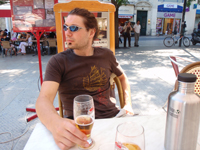 Zeno in the Jungle, Through the Window of a Restaurant in Little Saigon
Zeno in the Jungle, Through the Window of a Restaurant in Little Saigon
ZENO IN THE JUNGLE
...if everything when it occupies an equal space is at rest, and if that which is in locomotion is always in a now, the flying arrow is therefore motionless.
—Aristotle, Physics, 239b.5
Remember Zeno's paradox
of an arrow in flight?
Replace that arrow
with a bullet
some time in, let's say, 1969.
Now place that ammunition
in a young serviceman's rifle
somewhere in a jungle.
The grass will sway just so, or perhaps
it will be the glint of sun on metal,
or some sound like a whisper in his ear
and he will move
as he has been trained to move
and raise his arm and aim.
If we pause a moment—
as his finger caresses the trigger,
softly, as he will caress
his sons when they are born—
and believe
that Zeno's paradox holds true,
we can believe that this moment, like every moment,
is motionless. The world is paused
from its locomotion, its constant turning,
a cat waiting to pounce, or a snake to strike.
In that moment our soldier will never be
a father, will never leave the jungle,
the bullet will never reach its mark,
halted always
still in the chamber,
and he will be still
young,
and unchanged.
Fly forward now through the years,
like an arrow in flight permitted to move,
past the birth of twins,
one marriage failed and another one forged,
past the collapsed back
and the weak heart.
We find him
unable to sleep but not to dream, every night
waking with sweat coating his backó
like the sweat he could not escape
once in a jungle—
returning to a moment
when his aim
was true, as these dreams are true.
Could I render motionless the dreams
if I told him of Zeno,
if I could make him believe
that version of truth?
From some philosopher long dead
as another boy in some jungle is long dead.
I would say: You are not
the boy who fired a gun. (You are not a boy.)
You are not your past, (You have no past.)
you are only now, (There is only now.)
and new, from this moment, (There are only moments.)
and with every moment, your life
begins again.
THROUGH THE WINDOW OF A RESTAURANT IN LITTLE SAIGON
It was she who exclaimed,
"That man looks like you."
I turned my head
from the spoon half-raised
from my bowl of Pho
to see a man already turned
and moving away
in the late-morning rain.
It was she—who had never met my father—
who saw something in the face
of a Vietnamese man older than me
that echoed me
the way a raindrop
approaching a puddle is echoed
in the puddle's reflection until the drop collides
with itself and warps into the whole.
A world I had never considered
crawled in then like fast-moving fog
or steam following jungle rain
in a place far from here where my father toured twice
once upon a time.
A world away:
My father, younger, his gray hair
turned back to brown, the failed joints
of his body working again, his back
unfurled like a dying plant given a drink,
his life as fresh as a field after planting.
Living a life he never lived, later and elsewhere,
and here is a woman he loves
like he will never love, later and elsewhere.
I imagine him
reading poetry to her those nights
while—if you listen closely to the distanceó
the world changes or stays the same
with the sounds they pretend
are just the sounds of a storm approaching.
He reads from a book whose language
he does not speak,
my father who does not read anything
but the new day's news,
and the words drip
off his tongue like drops of water.
He says "Love"
in Vietnamese, my father who does not speak
Vietnamese, who never
says "Love."
Does he take her
into the grass beside the river that night
as the humidity clings to him
as they cling to each other?
Do they mark each other somehow,
realize they are both the same and different,
the way the shoreline holds the shape of rivers
but can never be water, or water the shore?
What did he leave
in that country, along with the sweat and tears
and spent bullet casings
and a woman he never mentioned?
Did he leave something
he would never know,
washed away like footprints in the sand
before he ever learned?
And when was it that his life
there branched apart, offering divergent paths
of the same river,
and he chose the stream
to the ocean that carried him
home and, years later, to me?
And what was it my own partner
recognized through that rain-streaked restaurant window?
Was it just
a reflection she saw
of myself transferred
to the body of some other man,
or myself in another life,
or something else entirely?








